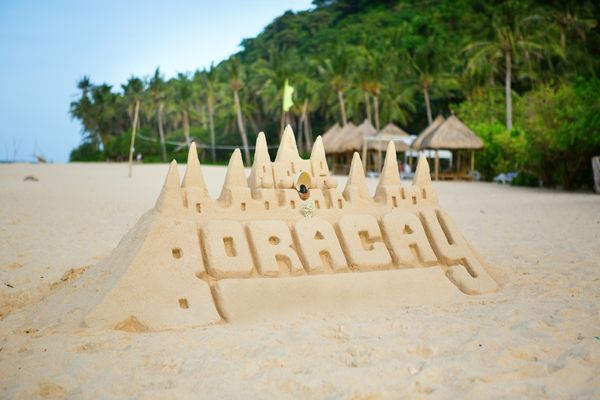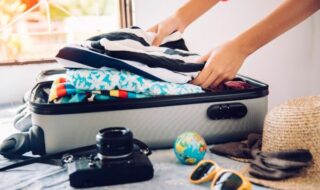
The beautiful island of Boracay in the Philippines attracts millions of tourists every year. In spite of this, it is not immune from scams like any other popular tourist destination.
Explore some of the most common Boracay scams that victimize tourists.

Table of Contents
Overpriced tours or activities
Tours and activities in Boracay which are overpriced refer to situations in which vendors or tour operators charge tourists more than the usual price for those tours and activities. From island hopping to snorkeling, parasailing to zip-lining, this can happen with any type of activity or tour.
Tourists often approach vendors or tour operators without first researching the usual price for the activity. Taking advantage of the tourist’s lack of knowledge, the vendor may quote a price that is significantly higher than what is considered fair.
Vendors may also add hidden fees or additional charges that are not disclosed upfront, resulting in a significantly higher final price than initially discussed.
There is also the possibility that tourists may encounter overpriced tours or activities through third-party websites or agents, who may charge additional fees or commissions on top of the regular price.
For tourists to avoid falling victim to this scam, it is important to research the usual price for a particular tour or activity before making a reservation. If they wish to compare prices from different vendors, they can check online reviews, ask for recommendations from trustworthy sources, or ask for recommendations from trusted sources.
Make sure to ask about any hidden charges or fees before making a payment and agree on the price upfront. Last but not least, tourists may wish to consider booking tours and activities through reputable hotels or resorts, which may offer more transparent pricing and higher levels of service.
Sand arts photo
Boracay is a popular destination for sand art, where artists create intricate designs and sculptures on the beach using sand as their medium. In spite of the fact that these sand artworks can be impressive and visually pleasing, there is a growing trend of sand art photo ops that may be considered an annoyance by some tourists.

Typically, a sand art photo opportunity involves the creation of a design or sculpture, followed by the invitation to tourists to pose with the artwork. Occasionally, the artist may offer to take the photograph using the tourist’s own camera or phone.
While some tourists may find it enjoyable to take a unique photo with a beautiful sand art design, others may find it annoying. As a result of the sand art photo op, there may be a crowd on the beach and some congestion, particularly if more than one artist is providing the service at the same time.
In addition, some tourists may feel pressured or obligated to purchase the photo, even if they are not inclined to do so. There are also artists who may use aggressive tactics to entice tourists to participate, which can create a negative experience for tourists.
Additionally, the sand art photo op may cause erosion of the beach due to the constant foot traffic and movement that disturbs the sand.
In order to avoid the inconvenience of sand art photo ops, tourists may decline the offer or take photos from a distance. While it is important to respect the artists and their craft, it is also important to take into consideration the impact this activity may have on the beach and its surroundings.
Beach chair rentals
On Boracay’s beaches, beach chairs are a common service, providing tourists with a comfortable place to relax and enjoy the sun. Beach chair rentals, however, are subject to a common scam that tourists should be aware of.
An example of a beach chair rental scam involves vendors renting out beach chairs and umbrellas at an exorbitant price, often charging much more than is reasonable or fair. The vendor may also add hidden fees or additional charges that are not disclosed upfront, resulting in a much higher final price than what was originally offered.
Furthermore, some vendors may require tourists to pay in advance, even if they intend to use the chair only briefly. In particular, tourists who intend to use the chair for only a short time may find themselves paying more than the service is actually worth.
Prior to renting a beach chair, tourists should conduct research and compare prices from different vendors in order to avoid falling victim to this scam. You may ask trusted sources for recommendations, check online reviews, or simply walk along the beach to compare prices.
Make sure you ask about any hidden fees or additional charges before making a payment and agree on the price upfront. Lastly, tourists may consider bringing their own beach towel or mat, which is more cost-effective and more comfortable
Touts peddling “genuine” products
A common scam in Boracay involves touts peddling “genuine” products to tourists looking for souvenirs or local products. Street vendors or touts approach tourists and offer them “genuine” or “authentic” local products, such as handicrafts, jewelry, or clothing.
Often, these products are not genuine or of low quality, and may not be worth the price the vendor is asking for. To convince tourists to purchase a product, the vendor may even use high-pressure sales tactics or make false claims about its origin or value.
It is also possible for touts to attempt to sell counterfeit products that mimic popular brands or designs, such as fake designer handbags and sunglasses. In spite of the claims of the vendor, these products are often of poor quality and may not last very long.
When approached by street vendors or touts peddling products, tourists should be cautious in order to avoid falling victim to this scam. Before making a purchase, they should be wary of claims that a product is “genuine” or “authentic,” and should carefully inspect any items they are considering.
The quality of souvenirs and local products may also be easier to verify in reputable shops or markets. You may also want to ask trusted sources for recommendations, such as hotel staff or local residents, who may be able to suggest reputable vendors or shops.
Fake tickets or passes
There is a common scam in Boracay known as the fake tickets or passes scam that targets tourists who are interested in attending popular events or attractions on the island. Typically, street vendors or touts offer tourists fake or counterfeit tickets or passes for popular events or attractions, such as boat tours, water parks, or cultural performances.
In many cases, the vendor makes false claims about the authenticity or availability of the tickets, or may offer the tickets at a significantly reduced price, making them appear to be a great value. The tickets or passes that are being offered are fake and will not provide access to the desired event or attraction.
Some vendors may also use high-pressure sales tactics or make false claims about the quality or value of the tickets in order to persuade tourists to make a purchase. Tourists who purchase fake tickets will likely be turned away at the entry gate of the event or attraction, leaving them with a worthless piece of paper and a missed opportunity to enjoy Boracay.
Tourists should exercise caution when approached by street vendors or touts who offer tickets or passes in order to avoid falling victim to this scam. Tickets should only be purchased from reputable sources, such as the official ticket office or a reputable tour operator. Additionally, it is important to verify the authenticity of the tickets by looking for official branding or logos, or by contacting the event or attraction directly.
Scammers often use discounted prices that seem too good to be true to lure in their unsuspecting victims. Tourists can avoid becoming victims of this scam on Boracay by conducting thorough research and verifying the authenticity of tickets and passes.
ATM skimming
In Boracay, ATM skimming is a type of scam that involves criminals installing devices on ATMs that are designed to steal a person’s debit or credit card information. As these devices are often designed to blend in with the ATM, it is difficult to detect them when they are attached to the card reader, keypad, or in other areas of the machine.
The skimming device reads the card’s magnetic strip, which contains the card number and other sensitive information, when a person inserts their card into an ATM. It is also possible that the device may record a person’s PIN number as they enter it on the keypad.
It is possible for the criminals behind the scam to use the stolen information to make fraudulent purchases or withdraw money from the victim’s account as a result of the scam. The victim may not be aware of the theft of their personal information until they discover unauthorized transactions on their bank statement.
It is important for tourists to take precautions when using ATM machines on Boracay in order to avoid falling victim to this scam. When using an ATM, it is important to be vigilant, looking for signs of tampering or suspicious devices attached to the machine. Additionally, tourists should cover the keypad with their hand when entering their PIN number in order to prevent criminals from recording it.
A person should notify the bank or financial institution immediately if he or she suspects that an ATM has been compromised. In addition, it is imperative to regularly monitor bank statements and transaction histories for any indications of unauthorized activity.
It is also a good idea for tourists to use ATMs located in well-lit and busy areas, as these are less likely to be targeted by criminals. Whenever possible, travelers should use credit cards or other payment methods that offer additional fraud protection in order to avoid carrying large amounts of cash while on the road.
Prostitution
Prostitution is illegal in the Philippines, including in Boracay, and tourists should be aware that engaging in any type of sexual activity with a person in exchange for money or other forms of payment is against the law and can have serious consequences.
Despite this, there are still some individuals who may attempt to scam tourists by posing as prostitutes or sex workers. The scam involves a person, often a woman, who approaches a tourist and offers sexual services in exchange for money. Once the transaction is completed, the individual may then take the money and leave, without providing the services that were promised.
In some cases, these individuals may also work in tandem with other criminals, who may attempt to rob or assault the tourist once they have been lured into a vulnerable position.
To avoid falling victim to this type of scam, tourists should avoid engaging with individuals who are soliciting sexual services, as this is not only illegal but also puts them at risk of being scammed or victimized in other ways. It is also important to be aware of the risks of engaging in any type of sexual activity with strangers, as this can increase the likelihood of contracting sexually transmitted infections or other health risks.
If a tourist encounters a situation involving prostitution, they should report it to the local authorities, who can take appropriate action to address the situation and ensure the safety of all individuals involved.
Timeshare scams
Timeshare scams are a type of scam that can occur in Boracay and other popular tourist destinations. These scams involve a company or individual offering tourists the opportunity to purchase a timeshare, which is essentially a portion of a property or vacation unit that can be used for a specified period each year.
The scam works by offering tourists the chance to purchase a timeshare at a greatly reduced price, often through high-pressure sales tactics and the promise of exclusive benefits and rewards. Once the tourist has purchased the timeshare, however, they may find that the promised benefits are not as valuable or accessible as they were led to believe, or that the timeshare is difficult to sell or transfer.
In some cases, the company or individual offering the timeshare may be fraudulent and may disappear with the tourist’s money, leaving them with a worthless investment.
To avoid falling victim to timeshare scams in Boracay, tourists should be wary of any offers that seem too good to be true, and should carefully research any company or individual offering a timeshare. They should also be cautious of high-pressure sales tactics and should take the time to read and understand any contracts or agreements before making a purchase.
Tourists should also be aware that timeshares can be difficult to sell or transfer, and may not provide the same level of benefits or rewards as advertised. They should carefully consider the long-term costs and commitments associated with owning a timeshare before making a purchase and should seek advice from a trusted legal or financial advisor if needed.
Overall, by being cautious and informed, tourists can avoid falling victim to timeshare scams in Boracay and other popular tourist destinations.
Tricycle rides
In Boracay, tricycles are a common mode of transportation. Although most tricycle drivers are honest and reputable, there are some who may attempt to scam tourists by overcharging or taking longer routes.
The most common tricycle scam involves drivers offering a flat rate rather than using a meter, resulting in a much higher fare than would otherwise be the case. The driver may also refuse to use the meter or negotiate a fare that is significantly higher than the standard rate, particularly if they believe the tourist is unfamiliar with the area or may be in a hurry.
Taking longer routes to increase the fare is another scam, particularly if the driver believes that the tourist is unfamiliar with the area or may not notice the deviation from the usual route.
Tourists should be aware of the standard rates for tricycle rides in Boracay, and should insist that the driver use a meter or negotiate a fare that is reasonable and in line with local prices. In addition, they should be cautious of drivers who offer a flat rate or who are unwilling to use the meter, as well as be aware of the usual routes and distances for the areas they wish to travel.
Other modes of transportation, such as walking or hiring a private car or taxi, may also be suitable for tourists, particularly when traveling long distances or at night. In Boracay and other popular tourist destinations, tourists can avoid being victims of tricycle scams by being informed and vigilant.
Diving equipment rentals
Diving is a popular activity in Boracay, and while most diving equipment rental shops are honest and reputable, there are some that may attempt to scam tourists by offering faulty or substandard equipment, or by overcharging for equipment rentals.
One common scam involves rental shops offering equipment at a lower rate than other shops, but providing equipment that is faulty or in poor condition, which can be dangerous for divers. In some cases, the equipment may be old or poorly maintained, increasing the risk of malfunction or failure during the dive.
Another scam involves rental shops overcharging for equipment rentals, particularly if they believe the tourist is not familiar with the local rates or the quality of the equipment. In some cases, they may also add additional fees or charges to the rental agreement, which can result in unexpected costs for the tourist.
To avoid falling victim to diving equipment scams in Boracay, tourists should research and compare equipment rental shops before making a rental, and should choose a reputable shop that is known for providing high-quality, well-maintained equipment. They should also be aware of the usual rates for equipment rentals in the area, and should be cautious of rental shops that offer significantly lower rates or are reluctant to provide detailed information about their equipment or rental policies.
Tourists should also inspect the equipment before renting it, and should ensure that it is in good condition and free from defects or damage. They should also be aware of any additional fees or charges that may be added to the rental agreement, and should ask for clarification if they are unsure about any aspect of the agreement.
By being informed and vigilant, tourists can avoid falling victim to diving equipment scams in Boracay and other popular tourist destinations, and can enjoy a safe and enjoyable diving experience.
Porters who demand high tips
There are porters who offer to carry tourists’ luggage to their destination at the airport or seaport in Boracay. Although most porters provide a valuable service, there are some who may attempt to scam tourists by insisting on a high tip.
A common scam involves porters who insist on receiving a high tip, even when carrying only a small amount of luggage or for a short distance. It is possible that they may even demand payment for carrying luggage for which the tourist did not request assistance.
In order to prevent being a victim of porter scams in Boracay, tourists should be aware of the usual rates for porter services in the area, and should negotiate a fair price or tip for the services rendered. Furthermore, they should be cautious of porters who insist on a high tip, particularly if the amount seems unreasonable or if the porter provided little or no assistance.
In addition, tourists should be assertive and firm in their interactions with porters, and should not allow themselves to be intimidated or coerced into paying more than they are comfortable paying. Additionally, they should be aware of and respect the local customs and practices regarding tipping.
The key to avoiding porter scams in Boracay and other popular tourist destinations is to be informed and assertive. In this way, tourists will be able to ensure a smooth and enjoyable travel experience.
Why scams happen in Boracay
reasons. Some of the main reasons why scams occur in Boracay include:
High tourist traffic
Boracay is a popular destination, attracting a large number of tourists every year. This high volume of tourist traffic can make it easier for scammers to operate, as they can blend in with the crowds and take advantage of unsuspecting tourists.
Lack of regulation
The tourism industry in Boracay is largely unregulated, which can make it easier for scammers to operate without fear of consequences. There are few laws or regulations in place to protect tourists from scams or to hold scammers accountable for their actions.
Economic incentives
Scammers may be motivated by the economic incentives of the tourism industry in Boracay. Many tourists are willing to spend money on tours, activities, and other experiences, and scammers may see an opportunity to make money by offering fraudulent or substandard services.
Cultural differences
Boracay has a diverse population, with many different cultures and languages represented. This can make it easier for scammers to take advantage of tourists who may be unfamiliar with local customs and practices.
Lack of awareness
Many tourists who visit Boracay may not be aware of the scams that exist in the area, or may not know how to recognize and avoid them. This lack of awareness can make them more vulnerable to scams and more likely to fall victim to them.
Overall, while scams can be frustrating and upsetting for tourists, they are a reality of the tourism industry in Boracay and other popular destinations. Tourists can protect themselves from scams by being aware of the common scams in the area, researching and choosing reputable service providers, and being cautious and vigilant in their interactions with locals and service providers.








